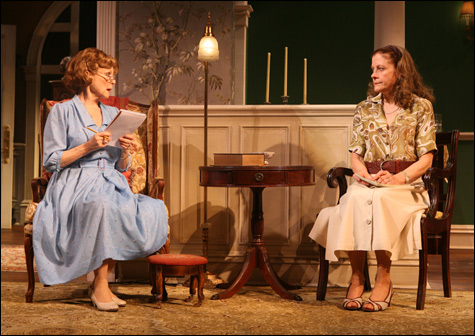
LONE STAR CHEKHOV Penny Fuller as Lucille and especially Hallie Foote as Mary Jo marry sweetness to satire. |
If Chekhov had been home on the range instead of the steppes, he would have been Horton Foote. It is common to describe Foote, who died in March at 92, as a small-town-Texas Chekhov. But the Tony-nominated Dividing the Estate, which follows a Broadway run with a transfer to director Michael Wilson's home turf of Hartford Stage (through July 5), is especially redolent of the Russian master's Uncle Vanya and The Cherry Orchard, with ham and sweet potatoes standing in for the samovar. The play not only depicts a landed gentry going ungently into its good night, it does so with big forkfuls of comedic compassion.
"Off with your greedy, nostalgic heads!" a less generous writer might say to the middle-aged children clawing for their shares of once-grand holdings in the Southeast Texas burg of Harrison (stand-in for Foote's home town of Wharton) in the waning days of Reaganomics. But the Oscar- and Pulitzer-winning Foote finds the benevolence and bewilderment wrapped into the noblesse oblige of a sheltered lot brought up in a dust cloud of kindly privilege that's about to dissipate. One member of the clan — defector-to-Houston Mary Jo, who's played by the dramatist's daughter, Hallie Foote, as a sharp-billed little bird struggling to maintain a tenuous place in the pecking order — is unabashedly grasping. And her preening airhead daughters are equally shallow, if more indolent in their pursuit of material girlhood. But the rest of Foote's eccentric clan, fighting over wisps of largesse as the servants dole out supper, are more clueless than selfish.

With its talk of fluctuating oil prices and property foreclosures, Dividing the Estate, which Foote wrote in 1987 but has since revised, feels eerily familiar — though its floundering gentry are waving goodbye not so much to recently procured mega-wealth as to the more modest ease enjoyed by generations. And here as elsewhere, Foote's chronicling of the clannish and social skein of his home town is as evocative as it is tenderly humorous and idiosyncratic.
Except for Mary Jo, the family not only prays but stays together — under the roof erected by its progenitors on what was once a lovely street bordering fields but is now encroached upon by honking traffic and fast-food joints. Stately if controlling matriarch Stella will not hear of dividing the estate (mostly tenant farms) to serve the individual interests of her non-income-earning kids, two of whom — widowed Lucille and alcoholic Lewis, better known as Brother — still live at home. Lucille's offspring, called Son by all including his fiancée, doles out allowances and manages the place, which is otherwise attended to by a couple of maids and a shaky 92-year-old factotum who fiercely defends his right to wait tables but spends more time dreaming of a barely ante-bellum past as he orchestrates his funeral.
The dramaturgy is old-fashioned, but the characters are incisively drawn, none more so than Lewis, who is in Gerald McRaney's skilled rendering courtly when sober but plagued by demons that include not only alcohol but a nubile young employee of the nearby Water Burger who has gotten him into trouble that necessitates borrowing yet again from the estate. Mary Jo owes the house kitty even more than Lewis does. And it falls to Son to manage his sponging if well meaning kin, always with their hands out and their eyes closed.
Wilson's pitch-perfect production unfolds in the living and dining environs of the home depicted at the center of a bucolic scene on the scrim that delineates the proscenium built into what is usually Hartford's thrust stage. Jeff Cowie's set, with its pillars and lattice and worn upholstery prints, conjures faded gracious living, and John Gromada's hymn-based sound design contributes to the down-home mood. The performances marry sweetness to satire, with actress Foote's Tony-nominated turn the most daringly broad. Playwright Foote, with his gift for capturing simpler times awash in human complexity, may be gone, but thanks to the small-town Lone Star Forsyte Saga stretched across the canvas of his 60 interrelated plays, the story of the particular, peculiar region that held him in its thrall for most of the 20th century lives on, well and perceptively told.